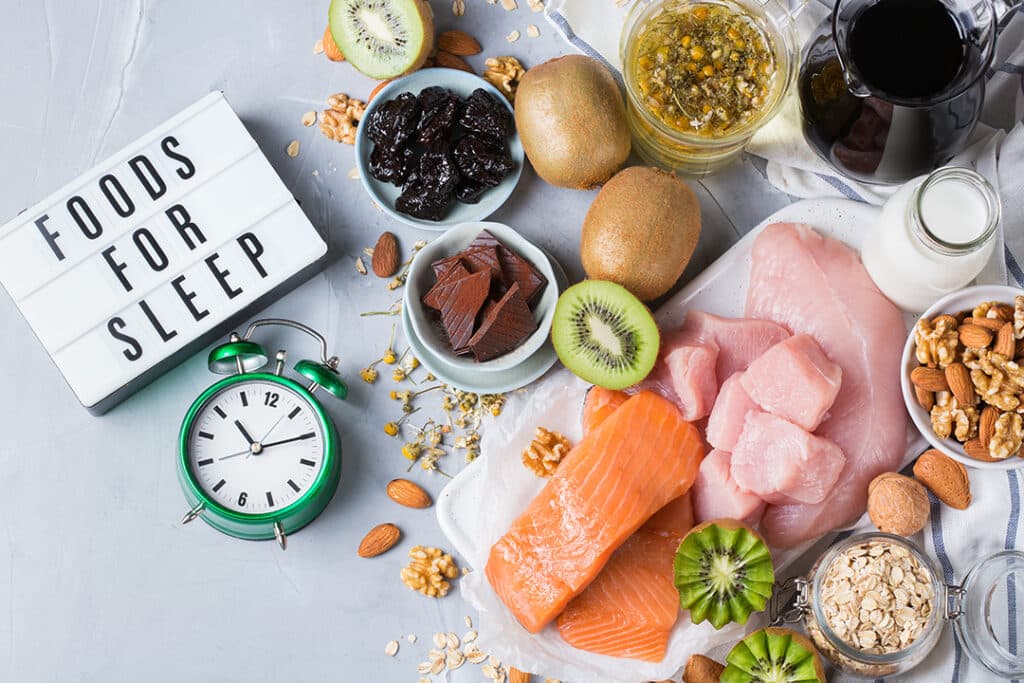Your diet may have more impact on your sleep than you think. Here’s a list of our top 20 foods that help you sleep.
You’ve probably heard the phrase you are what you eat – but did you know that diet can affect how you sleep, too?
Sure, it’s obvious that drinking a caffeine-powered espresso right before bed is not the best way to prepare your mind and body for bed. But there are other diet dos and don’ts that can significantly improve your quality of sleep.
Let’s dig into the best foods to eat for better rest!
What’s the Link Between Diet and Sleep?

Food can either be your best friend or your worst enemy when it comes to sleep. That’s because what you eat affects your sleep quality in a few different ways. Here’s how:
> Hormone Production
Our bodies rely on certain hormones to regulate our sleep cycles. You probably already know about melatonin, the “sleep hormone.” Melatonin signals to your body that it’s time to sleep and is most closely in charge of your circadian rhythm. But, there are other hormones, too. Serotonin, a feel-good mood-regulating hormone, also plays a role because it can be converted into melatonin. Foods rich in the amino acid tryptophan (like your Thanksgiving turkey) also help boost serotonin levels, which then increases melatonin to promote better sleep.
> Blood Sugar Levels
Beyond causing diabetes and weight gain, fluctuations in blood sugar levels can also disrupt your sleep. High blood sugar can make you feel wired, while low blood sugar can wake you up in the middle of the night. Eating balanced meals that include complex carbohydrates, proteins, and fats helps maintain stable blood sugar levels and helps you get better sleep.
> Nutrient Deficiencies
Certain nutrient deficiencies can make it harder to get a good night’s sleep. For instance, low magnesium levels are linked to insomnia and restless leg syndrome or leg cramps. Calcium also plays a crucial role in sleep regulation, as it is needed to create melatonin. Ensuring you get enough of these nutrients through your diet can help improve sleep quality.
> Stress and Inflammation
Chronic stress and inflammation don’t just ramp up pain and irritability – they can also interfere with sleep. Foods rich in antioxidants and omega-3 fatty acids help reduce inflammation and stress so you can enjoy more restful sleep.
Key Nutrients for Sleep
To get a good night’s rest, you need a balanced intake of certain nutrients. But are you getting enough of the right ones? Here are some of the most common nutrients the body needs to rest well:
> Tryptophan
This is an amino acid that helps produce serotonin, which eventually converts to melatonin. Studies show that eating more tryptophan-containing foods or supplementing with tryptophan can increase feelings of sleepiness and help you fall asleep easier.
> Vitamin B6
This B-vitamin is used to convert tryptophan into serotonin. Those with lower levels of B6 tend to experience more disrupted sleep patterns.
> Calcium
Calcium works with magnesium to support relaxation. Those taking calcium supplements have reported better sleep quality than those who do not.
> Omega-3 fatty acids
Omega 3’s are known for combating inflammation and promoting brain health for better sleep. Studies show that those who have a healthy intake of omega-3 fatty acids have longer sleep duration and fewer sleep disruptions.
Foods that Help You Sleep

It’s clear that a healthy diet buys your ticket into dreamland. Incorporating certain sleep-friendly foods into your diet can make a significant difference in how well you rest. But which foods should you prioritize on your plate to maximize your sleep?
From complex carbs to lean proteins and nutrient-packed nuts, these 20 foods can help you relax and enjoy a deeper, more restorative sleep.
Complex Carbs
Carbohydrates can boost tryptophan levels in the blood, helping you sleep better. Carbs are why you feel sleepy after a big Thanksgiving dinner or feast – bread, potatoes, stuffing, pasta, and roasted veggies tend to be high in tryptophan-producing carbohydrates. But not all carbs are created equal! Complex carbs are the best choice, as they digest slowly and keep your blood sugar stable.
1) Whole Grains
Think brown rice, oatmeal, quinoa, and whole grain bread. These options provide a steady release of energy and are packed with fiber and nutrients.
2) Legumes
Lentils, chickpeas, and beans are all great choices for healthy carbs and protein. They offer a hearty dose of fiber, which helps maintain stable blood sugar levels.
3) Sweet Potatoes
Not only are these delicious, but they’re also rich in fiber and more vitamins than regular potatoes.
Lean Proteins
Lean proteins are a crucial part of a sleep-friendly diet. These proteins are not only packed with tryptophan, an amino acid that promotes the production of serotonin and melatonin, but they also support muscle repair and overall health. Including lean proteins in your meals can help stabilize blood sugar levels, which is key to avoiding those nighttime energy crashes that can wake you up.
4) Chicken
Chicken is a versatile and lean source of protein that contains tryptophan.
5) Turkey
Famously known for its high tryptophan content, turkey is an excellent choice for improving your sleep cycle.
6) Fish
Opt for fatty fish like salmon, which is rich in omega-3 fatty acids that help reduce inflammation and improve sleep quality.
Nuts and Seeds
Nuts and seeds might be small, but they pack a mighty punch when it comes to promoting better sleep. These nutrient-dense snacks are rich in magnesium, tryptophan, and healthy fats, all of which play vital roles in relaxing your muscles and calming your nervous system. Including a handful of nuts or seeds in your daily diet as a snack or incorporated into your meals can make a noticeable difference in your sleep quality.
7) Almonds
A great source of magnesium, which helps relax muscles and promote sleep.
8) Walnuts
These provide omega-3 fatty acids and melatonin, both of which contribute to better sleep.
9) Pumpkin Seeds
High in magnesium and tryptophan, pumpkin seeds are a great bedtime snack to help you wind down.
Fruits and Vegetables
Fruits and vegetables aren’t just good for your overall health—they’re also fantastic for improving your sleep. These nutrient-packed foods are rich in vitamins, minerals, and antioxidants that support bodily functions and enhance sleep quality. But, the average diet often lacks enough fruits and veggies to reap these benefits. Boost your fruit and vegetable intake by incorporating a variety of fresh produce into your diet to ensure a restful night.
10) Cherries
Cherries are one of the few natural sources of melatonin, which can help regulate your sleep cycle.
11) Bananas
High in potassium and magnesium, which help relax muscles and calm your body.
12) Kiwi
Rich in vitamins C and E, serotonin, and antioxidants, studies have shown that eating kiwi can improve sleep onset, duration, and efficiency.
13) Leafy Greens
Go for a variety – spinach, kale, and Swiss chard are all excellent sources of calcium and magnesium, both of which are crucial for sleep health.
14) Broccoli
Broccoli is in fiber and contains several sleep-promoting nutrients, such as calcium and vitamin C.
15) Carrots
Packed with beta-carotene and other antioxidants, carrots help reduce inflammation to promote better sleep.
Dairy Products
Dairy products have long been celebrated for their sleep-promoting properties, primarily due to their high calcium content. Calcium plays a crucial role in helping the brain utilize tryptophan to produce melatonin, the hormone that regulates sleep. Incorporating dairy into your evening routine can aid in muscle relaxation and create a sense of calm before bedtime. Here are some dairy options to consider.
16) Milk
A warm glass of milk is a classic sleep aid, but why? Milk combines tryptophan and calcium to help you drift off more easily.
17) Yogurt
Rich in protein and calcium, yogurt can be a great bedtime snack. It provides a balanced mix of nutrients that support sleep and muscle recovery.
Healthy Treats
A little indulgence before bed isn’t always a bad thing. Certain healthy treats can be both satisfying and beneficial for your sleep quality. By choosing the right ingredients, you can enjoy a sweet snack without worrying about tossing and turning all night.
18) Dark Chocolate
In moderation, dark chocolate can be beneficial due to its high magnesium content, which helps relax muscles and reduce stress. Just be mindful to choose dark chocolate with a high cocoa content and low sugar to avoid disrupting your sleep.
19) Honey
Adding a drizzle of honey to Greek yogurt or fruit salad not only adds sweetness, but also provides a small amount of glucose that can help your brain shut down orexin, a neurotransmitter that keeps you alert.
20) Chia Seed Pudding
Made by soaking chia seeds in milk (or a non-dairy alternative), chia seed pudding is a great source of omega-3 fatty acids, fiber, and protein. You can add a touch of honey or fresh fruit for a slightly sweet and very nutritious evening snack. Or try this chocolate peanut butter chia seed smoothie recipe!
Foods to Avoid for Better Sleep

Just as some foods can help you sleep better, others can sabotage your efforts for a good night’s rest. By understanding which foods to avoid, you can steer clear of sleep disruptions and nighttime discomfort. Here are some common culprits that might be keeping you awake:
Caffeine and Stimulants
Caffeine is a no-brainer when it comes to sleep disruptors. While you may feel you need a late afternoon energy drink pick-me-up or a warm cup of espresso after a nice meal, it’s better to go without. Caffeine is a stimulant that can keep you awake and jittery by blocking the action of adenosine, a brain chemical involved in sleep. Consuming caffeine too close to bedtime can significantly interfere with your ability to fall asleep and reduce the overall quality of your sleep.
> Coffee
Lorem ipsum dolor sit amet, consectetur adipiscing elit. Ut elit tellus, luctus nec ullamcorper mattis, pulvinar dapibus leo.
> Tea
Lorem ipsum dolor sit amet, consectetur adipiscing elit. Ut elit tellus, luctus nec ullamcorper mattis, pulvinar dapibus leo.
> Chocolate
Lorem ipsum dolor sit amet, consectetur adipiscing elit. Ut elit tellus, luctus nec ullamcorper mattis, pulvinar dapibus leo.
Sugary Foods
Sugar can cause spikes and crashes in your blood sugar levels which will make it harder to stay asleep. Eating a sugary dessert before bed can lead to an energy spike, followed by a rapid drop, which can wake you up in the middle of the night and disrupt your sleep cycle. Swap the treats below with fruit or yogurt to satisfy your sweet tooth without upsetting your sleep cycle:
> Candy
Candy is high in sugar and can disrupt sleep patterns by causing energy spikes and crashes.
> Soda
Packed with sugar and often caffeine too, which can keep you awake and restless.
> Pastries
Pastries, cakes, and other baked goods are often full of sugar and refined carbs. These can lead to unstable blood sugar levels and disrupted sleep.
Heavy and/or Spicy Foods
Do you love the tingle of a spicy curry, or crave the satisfying feeling of comfort food? Unfortunately, eating heavy or spicy foods like these before bed can cause indigestion and discomfort while you sleep. These foods can also increase your body temperature and lead to heartburn, making it difficult to fall and stay asleep comfortably.
> Fried Foods
Fried foods are heavy and loaded with fat which takes longer to digest. This can lead to heartburn (especially once you lie down in bed).
> Spicy Dishes
Spices can be a great way to boost your circulation and immunity. But, eating them later in the day can cause indigestion and raise your body temperature (making it hard to fall asleep). Instead, eat your spicy meals for lunch and opt for more gentle and balanced meals for dinner.
> Red Meat
Heavy and slow to digest, red meat can keep you awake and uncomfortable through the night. Eat red meat in small quantities and be sure to chew thoroughly! Or, opt for another protein choice (like chicken, turkey, or fish) that supports digestion and sleep.
Alcohol
While alcohol might make you feel sleepy initially, it can disrupt your sleep cycle and prevent deep, restful sleep. Alcohol can interfere with REM sleep, the most restorative phase of sleep, and cause frequent awakenings during the night, leading to a fragmented and less refreshing sleep.
> Wine
Can interfere with REM sleep, the most restorative phase of the sleep cycle.
> Beer
Along with interrupting your sleep cycles, drinking beer at night fills your bladder and can lead to more bathroom breaks through the night.
> Spirits
High alcohol content drinks significantly disrupt sleep patterns and reduce sleep quality, leading to less restful nights. Some spirits can also increase your body temperature or cause heartburn.
How to Create a Sleep-Friendly Diet

Now that you know what foods to eat and which to skip, let’s focus on creating a sleep-friendly diet plan. Beyond what you eat, we also want to think about balance and timing. Here are some tips to help you get started:
> Plan balanced meals.
Ensure your meals contain a good mix of complex carbs, lean proteins, and healthy fats. This balanced approach provides your body with steady energy throughout the day and helps prevent blood sugar spikes and crashes that can disrupt sleep. Complex carbs help boost tryptophan levels, lean proteins aid in muscle repair and hormone production, and healthy fats support overall brain function. Eating balanced meals also helps prevent indigestion and nutrient deficiencies that may lead to sleep issues, ensuring your body has everything it needs to maintain a healthy sleep cycle.
> Eat at regular times.
Maintaining a consistent eating schedule can help regulate your internal clock and improve sleep quality. Eating at regular intervals throughout the day keeps your blood sugar levels stable, which prevents energy crashes and helps maintain a steady flow of sleep-promoting hormones. Regular meal times also train your body to expect food at certain times, which can reduce late-night cravings and improve overall digestion.
> Go light with dinner.
Have you heard the saying “Eat breakfast like a king, lunch like a prince, and dinner like a pauper”? While you don’t have to be so regimented (or may want to experiment with intermittent fasting), eating a lighter meal at dinner time can help improve sleep.
Heavy meals cause discomfort and indigestion, especially if you don’t have several hours to let it digest before settling in between the sheets. Instead, opt for lighter meals that are easy to digest, such as salads with lean proteins, vegetable stir-fries, or soups. These options provide necessary nutrients without overloading your digestive system, allowing your body to focus on winding down for the night rather than processing a large amount of food.
> Hydrate wisely.
Staying hydrated throughout the day is crucial for overall health and well-being, but it’s important to time your fluid intake wisely to avoid disrupting your sleep. Aim to drink plenty of water during the day and taper off in the evening. Avoid large amounts of fluid right before bed to reduce the likelihood of waking up in the middle of the night for bathroom trips. Herbal teas, like chamomile or valerian root tea, can be a good option for a bedtime beverage as they keep you hydrated and help you wind-down.
Other Lifestyle Tips for Better Sleep

Beyond eating sleep-friendly foods, what can you do to improve your sleep?
> Establish a sleep routine.
Just as following regular meal times is key for healthy digestion, a regular sleep routine encourages restful sleep. Go to bed and wake up at the same time every day, even on weekends to keep your cycle in sync.
> Get regular chiropractic care.
Beyond helping you combat pain and improve your posture, regular chiropractic adjustments can also improve sleep quality. Misalignments in the spine can interfere with the function of your nervous system, leading to discomfort, pain, and poor sleep. By ensuring proper spinal alignment, chiropractic care promotes optimal nervous system function, which helps your body relax and recover more effectively. The result? Deeper, more restful sleep and a reduction in sleep disturbances.
> Tailor your diet with functional nutrition lab testing.
No diet works for everyone – even a sleep-friendly diet. The best foods for you will depend on your body’s unique needs.
The best way to find out what fuels you best is to get a functional nutrition lab test. These can help identify any nutritional deficiencies or hormone imbalances that might be affecting your sleep. Functional nutrition lab testing provides a comprehensive analysis of your body’s unique needs, based on your own body’s data. Rather than following arbitrary guidelines, this allows for a personalized approach to your diet.
For example, if tests reveal a magnesium deficiency, incorporating more magnesium-rich foods or supplements can help promote relaxation and better sleep. Or, perhaps you have a food sensitivity that’s leading to excess inflammation; functional nutrition can help you identify the culprit and make better diet choices for you.
> Coxy up with relaxation techniques.
What better way to wind-down at night than a relaxing ritual that supports mind and body? Incorporating relaxation techniques into your bedtime routine can greatly reduce stress and enhance your ability to fall asleep and stay asleep.
What techniques are best for sleep? Anything that helps you feel at ease. Activities such as yoga, meditation, deep breathing exercises, or even a warm bath before bed are great choices. These techniques shift the brain into a restful state which reduces stress and anxiety, lowers your heart rate, and prepares your body for a more restful night.
Eat Well, Sleep Well

Getting a good night’s sleep starts with what you put on your plate. By filling up on these sleep-promoting foods (and avoiding the ones that leave you tossing and turning), you’ll be well on your way to sleeping – and feeling – better.
If you’re ready to take a more targeted approach to improving your sleep, AlignLife is here to help. From holistic chiropractic care to personalized diet plans, our team of experts can help you create a sleep wellness plan to best support you.
Reach out to your local AlignLife Center today to learn how you can improve your sleep and quality of life with the help of our integrative care options.




